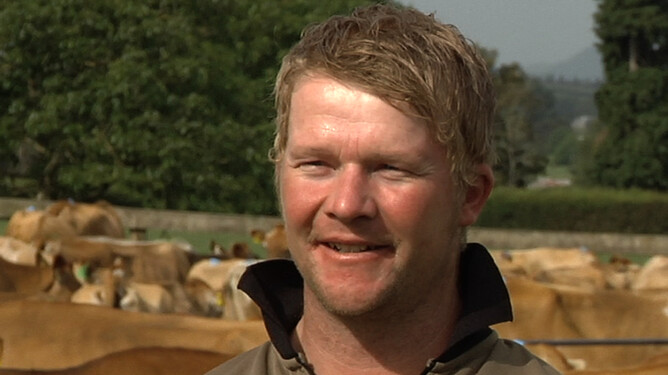A new meat and dairy certification system aims to capture the true value of meat and dairy exports grown on pastoral farms, and is expected to add at least 5% to the sectors’ current export earnings.
Rangedfree is a certification developed in New Zealand for meat and dairy exports that highlights to international consumers its animals have been raised and live outdoors.
The meat and dairy sectors are New Zealand’s highest export earners. According to Statistics New Zealand, in 2017 dairy exports were valued at $14 billion and meat exports at $6.6 billion.
Rangedfree, which is in the final stages of trademark registration, has been developed by New Zealand dairy farmer Wayne Shaw who says he saw an opportunity to showcase New Zealand farms, and their meat and dairy products, as being among the best in the world.
“The way we farm in New Zealand, where our animals are allowed to roam freely outside and graze on pasture, is not common farming practice in many countries overseas, even though it’s so normal to us,” says Shaw, who farms in Waikato.
Shaw, who has worked on dairy farms in Canada and the US says New Zealand farms – and their farmers – are highly-regarded overseas.
“Overseas we’re seen as the pinnacle, the top-end of meat and dairy producers,” he says. “The way we farm is so normal to us that we haven’t set our export price for meat and dairy accurately – we’re underselling ourselves.”
Shaw says the Rangedfree certification will provide an opportunity for New Zealand’s meat and dairy sectors to showcase the premium nature of their products with a widespread, industry-recognised brand. Exporters will be able to use a certification stamp or sticker on products to instantly tell international consumers that the product is sourced from outdoor-farmed animals.
“We produce premium meat and dairy products that are, by and large, from animals raised on outdoor farms, and consumers value this and are willing to pay more for these products,” he says.
“Through discussions and calculations with a research company and industry experts, we’ve conservatively estimated that Rangedfree has the potential to add at least 5%, more than $500 million, additional profit to New Zealand’s meat and dairy exports a year.
“The Rangedfree certification fills the gap that currently exists in terms of having a widespread, recognised brand that showcases the premium quality of our meat and dairy products to our export markets.”
Rangedfree certification criteria
Shaw says the vast majority of meat and dairy farms in New Zealand will meet Rangedfree criteria.
“Rangedfree certification is about giving those farms that seal of approval and for farmers to be able to go out there and say ‘I have a Rangedfree farm’ and be really proud of that.”
Rangedfree certification is granted to farms that can show their animals are largely grazed outdoors and are not housed indoors for more than 110 24-hour periods (days) in a year. That is, they must be allowed to range freely outside for at least 255 days a year on a rotational grazing system.
Rangedfree certification will be approved for farms based on the records they currently supply to their manufacturers and suppliers which outlines their farm’s housing structures and how long their animals spend indoors.
Shaw says the 110 days cap accounts for the colder winter and spring months where some animals are housed indoors for environmental reasons.
“As a farmer, I know most farms in New Zealand wouldn’t exceed 110 24-hour periods spent inside. This compares favourably to some of the standards I have seen overseas.”
Rangedfree certification and industry
Shaw says he has been in discussions with major industry stakeholders, showing them the Rangedfree certification programme and establishing support.
“In the early stages of developing Rangedfree I met with several people in the meat and dairy sectors to talk about how it would work, and the overwhelming sense I got was that a unifying certification like this was needed to highlight the premium nature of our meat and dairy products.
“There is no other certified trademark in the world that carries such stringent criteria around the time meat and dairy animals must be allowed to roam freely.”
Ultimately, Shaw says, when manufacturers and suppliers have 100% of their sourced products from Rangedfree farms, they can label their products with a Rangedfree ‘stamp’.
In time, he hopes the added premium Rangedfree certification brings to meat and dairy exports will enable manufacturers and suppliers to pass some of that profit on to its farm suppliers.
For more information, visit rangedfree.nz
